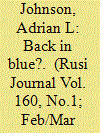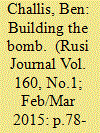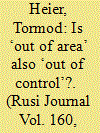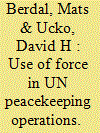| Srl | Item |
| 1 |
ID:
138430


|
|
|
|
|
| Summary/Abstract |
Since the end of the Cold War, the UK has generally made only modest military troop contributions to UN peacekeeping operations. As it prepares to review its defence and security strategy after the end of its long commitment to combat operations in Afghanistan, however, troop requirements for UN peacekeeping activities may appear again on the radars of policy-makers. Adrian L Johnson argues that there are broadly four options that the UK could take, the most likely being modest re-engagement with the military dimension of UN peacekeeping.
|
|
|
|
|
|
|
|
|
|
|
|
|
|
|
|
| 2 |
ID:
138435


|
|
|
|
|
| Summary/Abstract |
After the deterioration of Russian–Western relations over Ukraine, Moscow has shown itself keen to reinvigorate its relationship with Beijing as a preferred partner – especially but not exclusively in the all-important energy sector. In addition, the two countries’ common ambitions for a multipolar international structure enhance the mutual benefits of a strong partnership. Yet, Sarah Lain argues, the Sino–Russian relationship is characterised by increasing inequality, as Moscow finds itself needing Beijing more than Beijing needs Moscow.
|
|
|
|
|
|
|
|
|
|
|
|
|
|
|
|
| 3 |
ID:
138436


|
|
|
|
|
| Summary/Abstract |
The assumption underlying much of the debate about nuclear proliferation is that future proliferation threats emanate primarily from states outside the democratic community. In this winning essay of the Trench Gascoigne competition 2014, Ben Challis argues that this assumption is mistaken. Instead, he points to a number of common characteristics among authoritarian states that hinder their ability to pursue nuclear weapons, providing more flexibility and time in which the international community can respond. In contrast, many democratic states have the capacity to build nuclear weapons quickly and face growing incentives to do so – suggesting a reassessment of counter-proliferation efforts is required.
|
|
|
|
|
|
|
|
|
|
|
|
|
|
|
|
| 4 |
ID:
138434


|
|
|
|
|
| Summary/Abstract |
Small states that participate in coalition warfare find it increasingly difficult to maintain control over their armed forces. With the larger allies, such as the US, the UK and France, dominating military command structures, small states have become tactical providers of sophisticated force and, as such, enjoy little influence over strategy or campaign plans. Tormod Heier argues that NATO's 2011 intervention in Libya illustrates this problem well: smaller states such as Norway were compelled to navigate the differing interests of the UN and NATO while larger allies stretched the UN mandate towards regime change – leading Norway to terminate its mission early.
|
|
|
|
|
|
|
|
|
|
|
|
|
|
|
|
| 5 |
ID:
138437


|
|
|
|
|
| Summary/Abstract |
Among the myriad cultural activities that took place across the UK in 2014 to mark the entenary of the outbreak of the First World War, it would have been surprising had Shakespeare been omitted, such is the unrelenting popularity of the ‘national bard’.
|
|
|
|
|
|
|
|
|
|
|
|
|
|
|
|
| 6 |
ID:
138433


|
|
|
|
|
| Summary/Abstract |
The decision-making surrounding the deployment of UK forces to southern Afghanistan in 2005–06 remains a matter of heated debate. In this personal recollection, Ed Butler, who led the British Task Force from mid-2005, highlights what he thinks were the shortcomings of policy-making and leadership within the political and military spheres during that time.
|
|
|
|
|
|
|
|
|
|
|
|
|
|
|
|
| 7 |
ID:
138431


|
|
|
|
|
| Summary/Abstract |
An ever-growing demand for troops to serve in ever-more complex environments has led to enhanced interest in the incentives and constraints facing newcomers to peacekeeping. Increasingly, these include post-war states from the global South. Peter Albrecht and Cathy Haenlein examine the recent record of Sierra Leone and the factors affecting its patterns of contribution to peace-support operations. In doing so, they stress the need for a full understanding of the specific experiences of conflict and recovery – and the relevance of national identity, financial capacity and domestic crises – in the calculations of states emerging from civil war.
|
|
|
|
|
|
|
|
|
|
|
|
|
|
|
|
| 8 |
ID:
138429


|
|
|
|
|
| Summary/Abstract |
Although the demand for UN peacekeepers shows little sign of abating, a sense of uncertainty and malaise continues to colour discussions about the future of UN peacekeeping. Of the many issues facing the UN High-Level Independent Panel on Peace Operations that was set up in 2014, the use of force by UN peacekeepers is likely to attract particular attention. It is also likely to prove divisive, both among member states and within the Secretariat. While steps can be taken to strengthen the capacity of the UN to mount and conduct field operations, Mats Berdal and David H Ucko argue that the way forward does not lie simply in entrusting UN forces with ever-more ‘robust’ war-fighting mandates. Instead, more systematic attention needs to be given to strategically linking UN peacekeeping activities to political processes aimed at bringing violent conflict to an end. This will require far greater honesty from member states regarding their own responsibility in enabling the UN to do what they ask of it.
|
|
|
|
|
|
|
|
|
|
|
|
|
|
|
|
| 9 |
ID:
138432


|
|
|
|
|
| Summary/Abstract |
The changing character of war places increased emphasis on ‘smart power’ and non-lethal ‘soft’ effects. Establishing useful and accurate measures of effectiveness through which to assess the impact of such activities is essential, but these have so far proven elusive. Neil Verrall argues that now is the time for militaries to start thinking differently about the evaluation of full-spectrum effects within the Joint Action approach.
|
|
|
|
|
|
|
|
|
|
|
|
|
|
|
|